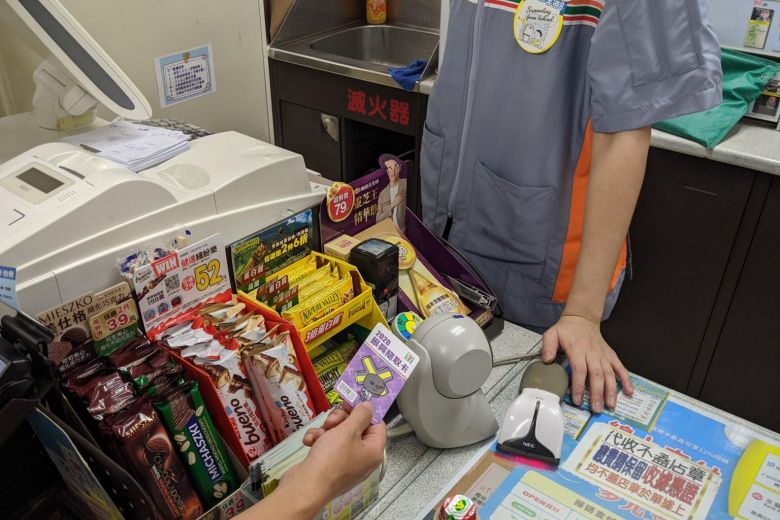Good response to Taiwan’s spending voucher program to boost economy hit by COVID-19

A customer pays at a convenience store in Taipei using her voucher value card.ST PHOTO: KATHERINE WEI
TAIPEI — Since mid-July, 88-year-old retiree Lin Chen Yueh-li has been shopping at 7-11 convenience stores more frequently, as she is getting more than what she pays for.
She is among at least 21.5 million people in Taiwan who have cash vouchers that can be used to purchase a wide range of goods and services, under a government program to invigorate the economy hit by the coronavirus outbreak.
Taiwanese and foreign spouses with permanent residency pay NT$1,000 (S$47) each for NT$3,000 vouchers that are valid until the end of the year. The payment is waived for low-income or disadvantaged households.
“What do I buy? Usually milk and yogurt… Looks like I’m getting a lot of dairy products this year,” Mrs Lin told The Sunday Times.
Ms Ou You-ning, 32, used her family’s vouchers to buy an iPad. “I’ve spent three sets of vouchers on an iPad,” said the beautician, who roped in her husband and her daughter.
Ahead of the issue of the vouchers on July 15, people were allowed to pre-order them online or at convenience stores. They could choose between paper vouchers, or electronic versions that would be collected via electronic payment apps or tied to credit cards or e-wallets.
Some banks’ automated teller machines can also convert vouchers into cash.
Many people had flocked to 7-11 convenience stores to pre-order the vouchers, as the chain offered an extra NT$1,000 worth of value. But there was a catch – one can only use the NT$4,000 for 7-11 merchandise.
“There’s so much at 7-11 I can buy, and the NT$4,000 will last me a good while,” said Mrs Lin.
American doughnut chain Krispy Kreme, bubble tea shops Tea Top and TP Tea, and even plastic surgery clinics also offer discounts to customers who wish to use the vouchers in lieu of cash.
Just a month after the NT$50 billion stimulus program was rolled out, over 21.5 million people had collected their vouchers. Taiwan has a population of 23.8 million people.
It is still unclear how many people have used their vouchers, as some businesses may not have cashed in all the vouchers they received.
The Ministry of Economic Affairs is expecting a consumption boost of NT$111.2 billion.
But the vouchers do come with some restrictions: they cannot be used to pay credit card bills, taxes or traffic tickets, or buy stocks, cigarette products or electronic tickets, among others.
The vouchers should not be used for everyday expenses, said Dr Darson Chiu, a macroeconomic forecast expert at the Taiwan Institute of Economic Research.
“We need additional consumption, not just buying pantry staples for your family… This is to revitalize the economy,” said Dr Chiu.
The programme has been compared to former president Ma Ying-jeou’s voucher initiative in 2009 during the global recession. Each Taiwanese received NT$3,600 then, and there were no limits on where or how the vouchers could be used.
While some have grumbled about having to spend money to obtain this year’s vouchers, experts say the program might turn out to be more effective than that of Mr Ma.
Dr Chiu thinks President Tsai Ing-wen’s administration has learnt from her predecessor’s misstep in issuing the vouchers when the economy was at its worst.
For the Covid-19 crisis, Taiwan suffered most in the second quarter, just after borders were closed, social distancing rules were in place, and many companies had to ask employees to go on unpaid leave. People were not inclined to spend extra money then.
“I believe the Tsai administration took into consideration the Cabinet’s business forecast. So they rolled out the bailout plans (for industries) first, and when the economy picked up in Q3, you try to bring it up higher by giving out vouchers,” said Dr Chiu.
In addition, by having Taiwanese pay for a portion of the vouchers, the government would have more budget left for the third phase of a NT$210 billion bailout plan that kicked off on Sept 1, allowing industry sectors to apply for subsidies.
Some in Taiwan hope that their vouchers can go towards supporting small businesses.
“I’d applied for digital vouchers, but when I realized many small businesses don’t take electronic payment… I cancelled the electronic vouchers and went for the paper version,” said Ms Kuo Yu-wen, 30, who works for an education non-government organization.
Ms Ou said the beauty salon she works at does not accept the vouchers, as the salon owner finds the cash-in process rather troublesome. “But business had already begun picking up in May (when pandemic measures were relaxed),” she noted.
Japanese restaurant waiter Wang Yi-ren, 41, has not seen a big increase in the number of customers. “Even before the vouchers were released, our regulars were already starting to come back, so I wouldn’t say the program brought us more business,” he said.
For more news about the novel coronavirus click here.
What you need to know about Coronavirus.
For more information on COVID-19, call the DOH Hotline: (02) 86517800 local 1149/1150.
The Inquirer Foundation supports our healthcare frontliners and is still accepting cash donations to be deposited at Banco de Oro (BDO) current account #007960018860 or donate through PayMaya using this link.